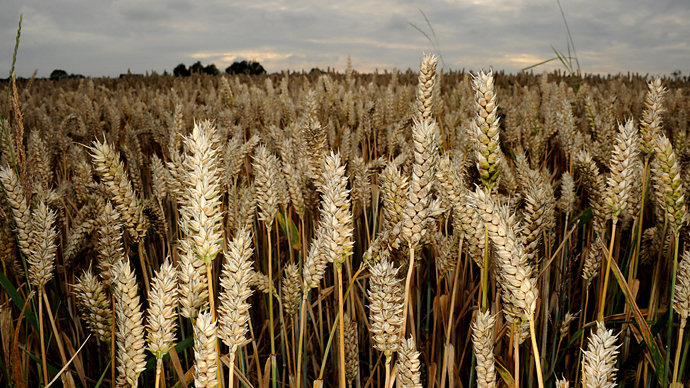Monsanto hit with class action lawsuits in mystery GMO wheat case

American Farmers have launched two class action lawsuits against biotech giant Monsanto following the discovery of unapproved genetically modified wheat growing in the Pacific Northwest. According to farmers, the company’s negligence has ruined sales.
Though the United States Department of Agriculture (USDA) has
never approved either the growing or sale of GMO wheat in the US,
the agency began investigating its existence when an Oregon
farmer found wheat growing in his fields that was resistant to
Monsanto’s patented Roundup pesticide, known by its scientific
classification as glyphosate.
That farmer sent samples of the Roundup-resistant wheat to Oregon
State University, which conducted tests on them. OSU then
contacted the USDA, which subsequently confirmed that the wheat
was a GMO variety that Monsanto had been authorized to field test
in 16 US states, including Oregon, from 1998 to 2005.
Surprisingly, the GMO wheat discovered in Oregon had somehow been
growing over a decade after test crops should have been destroyed
in 2001.
Though the scientific merits of the growing and consumption of
GMO crops are still a source of contention, genetically modified
wheat is a commercial liability for US farmers, who exported $8.1
billion worth of wheat in 2012 - nearly half of the total $17.9
billion US wheat crop.
Following the USDA’s confirmation that GMO wheat was present,
Japan immediately canceled a 25,000-ton import of soft white
wheat, and both South Korea and Europe announced more stringent
testing of American wheat shipments for possible contamination.
According to the plaintiffs in lawsuits filed against the biotech
giant, Monsanto should have been aware that open-air testing of
transgenic wheat posed a risk to farmers.
"The announcement led to immediate concern that the development could disrupt exports of soft white wheat from the Pacific Northwest. An official with the Japanese Embassy stated that the country would cancel orders for Pacific Northwest soft white wheat because Japanese people were 'concerned about the discovery of unapproved wheat,'" according to the complaint.

Though genetically modified crops such as corn, soy and canola
are common in the US, GMO wheat differs in that it would be
directly consumed by humans, rather than used for feed for
livestock. Moreover, consumers in both Asia and Europe are
sensitive to gene-altered foods, to the extent that both China
and Hungary both recently destroyed US imports found to be
genetically modified.
"Asian consumers are jittery
about genetically modified food," said Abah Ofon, an
analyst at Standard Chartered Bank in Singapore who spoke with
Reuters.
"This is adding to concerns
that already exist on quality and availability of food wheat
globally," he added.
The incident is not the first time that the discovery of GMO
crops have ruined export sales. In 2006, a large portion of the
American long-grain rice crop was found to be contaminated by an
experimental strain from Bayer CropScience, prompting import bans
in Europe and Japan. That incident led to sharply lowered market
prices, and the company eventually agreed in 2011 to pay $750
million to farmers as compensation.
The discovery of GMO seed in Oregon so many years after
Monsanto’s field trials concluded has alarmed critics, who say
that control measures on transgenic crops are dangerously
insufficient. Prior analysis conducted on GMO canola, for
example, has concluded that 83 per cent of wild canola plants
growing along roadsides in North Dakota tested positive for
genetic modification.
For its part, Monsanto has stated that its "own internal investigation has confirmed
that it did not have any prior test site at the location where
the material under investigation was reported to have been
present.” In other words, neither government regulatory
agencies nor the corporation can determine how GMO wheat found
its way to the Oregon fields.
Farmers contend that Monsanto was aware of the "potential detrimental market effects
arising from the use of such crops" but failed to enact
safeguards.
"Due to Monsanto's wrongful
conduct, soft white wheat destined for export markets for use in
food products has been rejected for the purposes for which it was
intended. Because scheduled shipments already have been postponed
and canceled, the presence of genetically engineered wheat has
detrimentally impacted the domestic and global wheat markets and
damaged plaintiffs and other wheat farmers," states one
complaint.
Plaintiffs now seek compensatory, exemplary and punitive damages
for negligence, nuisance and product liability, according to
Courthouse News. Farmers are also asking that Monsanto
decontaminate farmland, equipment and storage facilities that may
be tainted by GMO seed.














